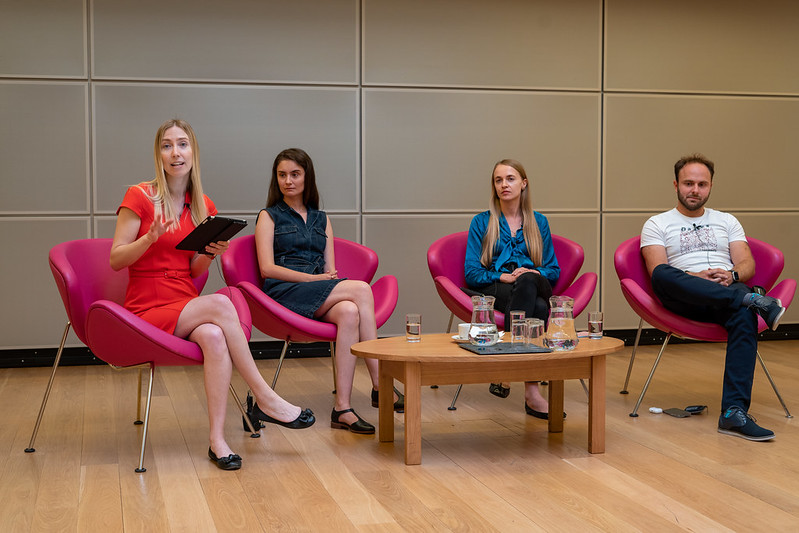
Three Gates Cambridge Alumni discussed the war in Ukraine at the recent Gates Cambridge Alumni Weekend.
Could the war against Ukraine have been predicted? What is the situation now and will President Putin ever face international justice?
These were some of the questions discussed by a panel of three Gates Cambridge Alumni at this year’s recent Gates Alumni Weekend which was attended by 32 alumni and 12 scholars from 19 countries.
The discussion on the war in Ukraine was led by Darja Irdam [2011], Director of Membership, Europe, for the Gates Cambridge Alumni Association.
The past
The panellists agreed that there were elements of the aggression against Ukraine that were predictable in hindsight. They said President Putin had invaded other neighbouring countries, including Georgia, Chechnya and Ukraine itself in 2014 (the illegal annexation of Crimea and invasion of Donetsk and Luhansk regions), had supported repressive action in Belarus and Kazakhstan and had made no secret of his imperialistic intentions. However, the extent of his ambitions – to take over a whole country – had still come as a surprise.
Georgiana Epure [2016], a legal associate at an international human rights organisation, said there was a collective failure by the West to show Russia that it would face severe consequences if it invaded Ukraine. Anastasiia Kamenska [2010], director of the Corporate Strategy in a healthcare company, added that, instead, Russia had “tested the system” in 2014 and decided that it could ‘get away’ with a full-scale invasion. Epure added that the framing of the war as Russia versus the West was damaging and made it more difficult for other BRICs countries to condemn Russia. Instead, she said, it should be framed as a war against the international rules-based order, which Russia is evidently trying to overturn.
Kamenska said countries that had signed the Budapest Memorandum on Security Assurances in 1994, including Russia itself and the UK, had pledged to respect Ukraine’s national borders, but signatories had taken no steps to honour that agreement in 2014 and did so to a limited extent only in 2022. She said the invasion was in large part designed to divert internal focus away from Russia’s economic and social failures at home.
Vsevolod Kachanov [2013], an actuarial consultant at a multinational insurance advisory organisation, agreed, saying Putin had chosen a convenient scapegoat – the West. Blaming NATO expansion was hypocritical since Putin prior to 2014 publicly committed to not annexing Crimea. Epure added that NATO is a defence organisation and post-Soviet states were asking to join and have security guarantees because of Russia’s aggressive actions. Finland and Sweden had recently applied to join NATO too. If Russia’s aim was to deter NATO, and the EU, from coming closer to its borders, it had, evidently, failed, she said.
The panellists also spoke about Putin’s use of propaganda, about Putin’s appeal in Russia to painful memories of the Second World War and historic fears of Nazism and apparent cultural Russian preferences for strong alpha male leaders. Additionally, the panellists discussed the gendered nature of war – the fact Ukrainian men had to stay to fight, but women were not safe either, risking trafficking while being internally and internationally displaced – as well as the EU’s unprecedented mobilisation for refugees. Kachanov shared that some members of his family had sought asylum in France and were provided welcome support including free housing, healthcare and economic assistance.
The present
Kachanov spoke about his home city of Kharkiv and the impact of daily shelling. Only half the population stayed in Kharkiv, he said, and nowhere in Ukraine is safe as the Russian army regularly targets civilian objects, falsely claiming they are exclusively targeting military objects as well as commiting atrocities across Ukraine – for instance, in Bucha. Speakers discussed the constant anxiety and yet the resilience of the Ukrainian people to keep going. Kachanov said Putin was betting on Western disunity amid the worsening cost of living crisis. He added that Putin had no face-saving way out of the war and it looked likely that there would be an ongoing war of attrition with the possibility of a dramatic mistake being made on either side in the coming months.
The future
Asked if Putin will ever face justice, Epure said international justice was slow but “patient” and outlined the different legal avenues being pursued against Russia and its leaders. “There is no doubt Putin is a war criminal,” she said.
Questions to the panel included how to support Ukraine more – Kamenska said one key way was to attend demonstrations for Ukraine as this puts pressure on home governments to do more – and why the Global South is not condemning Russia. Epure blamed economic interests, the potential for economic opportunities as a result of Western sanctions and a perception of Western double standards on human rights abuses.












